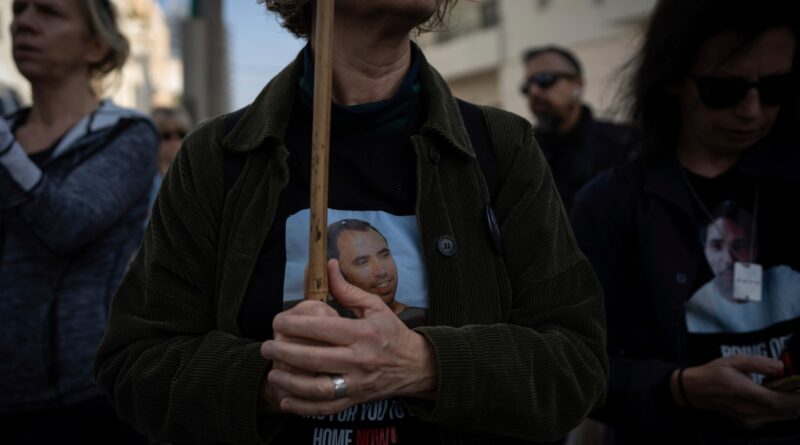Hamas gives ‘positive’ reply to proposal for hostage release deal
Blinken said that the response was being reviewed and that he would be “discussing it with the government of Israel tomorrow. There’s still a lot of work to be done, but we continue to believe that an agreement is possible and, indeed, essential.” He and other officials have characterized a hostage agreement as a steppingstone toward broader U.S. aims of a permanent political settlement in the Middle East, including a Palestinian state.
President Biden, informed of the Hamas reply in the White House just before he made public remarks on a floundering bipartisan Senate bill for supplemental funding for Ukraine, Israel and other crises, commented only briefly on the hostage issue.
“There is some movement, there’s been a response from Hamas,” Biden said, “but it seems to be a little over the top, and we’re not sure where it is.”
The proposal, negotiated among the United States, Qatar and Egypt, with participation by Israel, is a broad framework that includes an initial six-week cessation of fighting and release of all civilian hostages held by Hamas in Gaza. In return, Israel would release three Palestinian prisoners for every one hostage.
It would amount to the longest pause in fighting since the war started four months ago. There are about 100 hostages believed to still be alive, and Israeli officials say that Hamas is holding at least 29 dead bodies. The “vast majority” of the dead were killed during the Oct. 7 Hamas attack in southern Israel, according to a spokesman for the Israel Defense Forces. Washington’s hope is that an initial six-week pause can be extended, enabling a longer-term settlement to be put in place.
Israel has agreed in principle to the framework, and Egypt delivered the provisional terms to Hamas more than a week ago, according to people familiar with the negotiations, who spoke on the condition of anonymity about the sensitive matter.
In a brief public statement online, Hamas said it had “treated the proposal in a positive spirit to ensure a comprehensive and complete cease-fire, ending the aggression against our people,” ensuring humanitarian assistance for Gaza, an end to Israel’s “siege” and “completing a prisoner exchange.”
Both Blinken and Mohammed emphasized that work remains to flesh out the framework, with Israel and Hamas diametrically opposed to many of the details, including which Palestinian prisoners would be eligible for release and whether Israeli troops would withdraw from populated areas during the pause.
A key sticking point has been Hamas’s desire for any hostage deal to result in a permanent cease-fire — something Netanyahu has adamantly refused to consider, instead vowing to continue fighting until “total victory.” The Israeli prime minister has been under pressure from families of the hostages, some of whom have said their release should be Israel’s top priority. Other family members have agreed with extreme right-wing officials in Netanyahu’s government that there should be no agreement and called for the fighting to continue without letup until Hamas is vanquished and its leaders killed.
The Hamas response was received by Qatar just an hour before Blinken, who arrived here Tuesday evening during his fifth trip to the Middle East since the war began, held an initial meeting with Qatari Emir Tamim bin Hamad Al Thani in the luxurious Lusail Palace, where the two briefly discussed it.
The full Hamas document wasn’t provided to Blinken until his later meeting with the prime minister, according to a senior U.S. official who spoke on the condition of anonymity about the diplomatic talks.
U.S. officials had been waiting for days for the reply, telling reporters that “the ball is in Hamas’s court” and speculating that there were internal divisions within the militant group or that Israeli military gains deep into Gaza’s tunnels had Hamas on the run. Other people familiar with the negotiations suggested that communications difficulties, including a complete electricity blackout in Gaza since the war began and only sporadic cellphone and wireless communications, were largely to blame.
Communications were “some of the challenges,” Mohammed said, “but also the negotiation itself. It took some time in order to get them to a place where we get that response.”
The substance of Hamas’s response remained shrouded in secrecy, but it appeared positive enough for both the U.S. and Qatari diplomats to publicly raise hopes for the successful conclusion of a deal.
While revealing the details would not “benefit the negotiations,” Mohammed said, “the overall prospect of this looks for us, at least as we received it, giving more promising and more prospects for better results. We are hoping … to see it yielding very soon.”
Now that it has the reply in hand, Blinken said, “we will be working as hard as we possibly can to try to get an agreement so that we can move forward with not only a renewed but an expanded agreement on hostages and all the benefits that that would bring virtually everything that we do in diplomacy in general.” An initial agreement last November resulted in the release of 105 hostages during a week-long pause in the fighting before it fell apart.
The negotiations are taking place as Israel has continued attacks in Gaza, concentrating on the southern portion of the enclave where nearly 2 million people, more than three-quarters of the population, have been crammed into an ever-smaller piece of land to avoid ground assaults by Israeli troops and relentless airstrikes. More than 27,000 Gazans have been killed since the war began, according to the Gaza Health Ministry.
Mohammed repeated Qatar’s call for a full-scale cease-fire, a position supported by the majority of the world’s nations but rejected by Israel and the U.S. as an invitation for Hamas to regroup and rebuild. He also criticized the suspension of funding for UNRWA, the United Nations agency that coordinates and delivers most of the aid to Gaza, by the U.S. and several other nations in the wake of charges that 12 of its 13,000 staffers inside the enclave were involved in the Oct. 7 attacks on Israel.
“We cannot punish a humanitarian agency because of some accusations against some of its employees,” he said.
On each of his visits to the region, Blinken has sought to pressure Israel to reduce civilian casualties in Gaza and allow more humanitarian assistance into the enclave — objectives that have resulted in very little progress over the last few months amid escalating warnings of pending famine from the international aid community.
Asked at the news conference whether he was too “nice” to be secretary of state and wasn’t pushing Israel hard enough, the soft-spoken Blinken said, “I’ll let others speak to my character. All I can say is that most people who assume the position that I have the great privilege of assuming now don’t get there by being nice all the time.”
DeYoung reported from Washington. Sarah Dadouch in Beirut, Shira Rubin in Tel Aviv and Claire Parker in Cairo contributed to this report.




